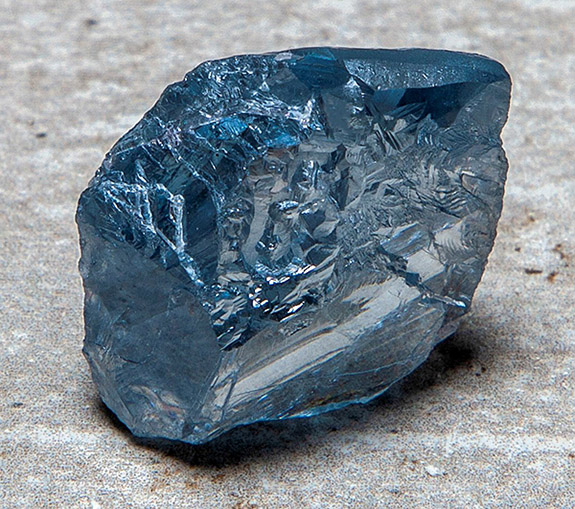De Beers and Diacore just jointly acquired an exceptional 39.34-carat blue rough diamond sourced at South Africa's iconic Cullinan Mine for $40.1 million, or just over $1 million per carat.
Discovered by Petra Diamonds in April and sold to the De Beers/Diacore partnership via a special tender on Monday, the extraordinarily rare stone has the industry buzzing because it is remarkably similar to a blue diamond unearthed at the same mine in 2014.
That 29.6-carat rough stone was subsequently purchased by luxury jeweler Cora International for $25.6 million ($846,000 per carat) and transformed into a 12.03-carat, internally flawless, cushion-cut, fancy vivid blue headliner that would be named The Blue Moon of Josephine.
In 2015, the polished gem was sold at a Sotheby’s auction for $48.5 million, or more than $4 million per carat. It was the highest price per carat ever paid for a diamond.
The Blue Moon of Josephine maintained nearly 41% of its total weight during the cutting process. If the same holds true for the 39.34-carat blue diamond, the result would be a 16-carat finished gem. At $4 million per carat, the gem could be worth $64 million.
“This sets a new milestone for Petra in achieving its highest price for a single stone,” commented the mining company's chief executive officer, Richard Duffy.
Tasked with unlocking the hidden beauty in the rough and creating a spectacular polished diamond is Diacore, a specialty cutter that has produced a number of high-profile diamonds, including the 203.04-carat De Beers Millennium Star and the 59.60-carat Pink Star.
The 39.34-carat rough diamond was unearthed in the C-Cut of Cullinan, a mine located at the foothills of the Magaliesberg mountain range, 37 kilometers northeast of Pretoria in South Africa.
In an ironic twist, De Beers sold the Cullinan mine to Petra in 2007.The Cullinan Mine is arguably the world’s most heralded diamond mine, having produced seven of the world’s 50 largest rough diamonds based on carat weight, including the largest ever found — the 3,106-carat Cullinan Diamond.
Discovered in 1905, the Cullinan Diamond was divided into nine major finished stones, each of which took the Cullinan name and a Roman numeral. Two of the gems are part of the the British Crown Jewels — the Great Star of Africa (Cullinan I) at 530.4 carats and the Second Star of Africa (Cullinan II) at 317.4 carats.
In addition to producing world-class white diamonds, the Cullinan mine is also the world’s most important source of blue diamonds. Blue diamonds owe their color to the presence of boron in the chemical makeup of the gem..
Scientists believe blue diamonds are among the deepest-formed diamonds ever found, created at depths in excess of 500km (310 miles) below the Earth’s surface.
Credit: Image courtesy of Petra Diamonds.

No comments:
Post a Comment